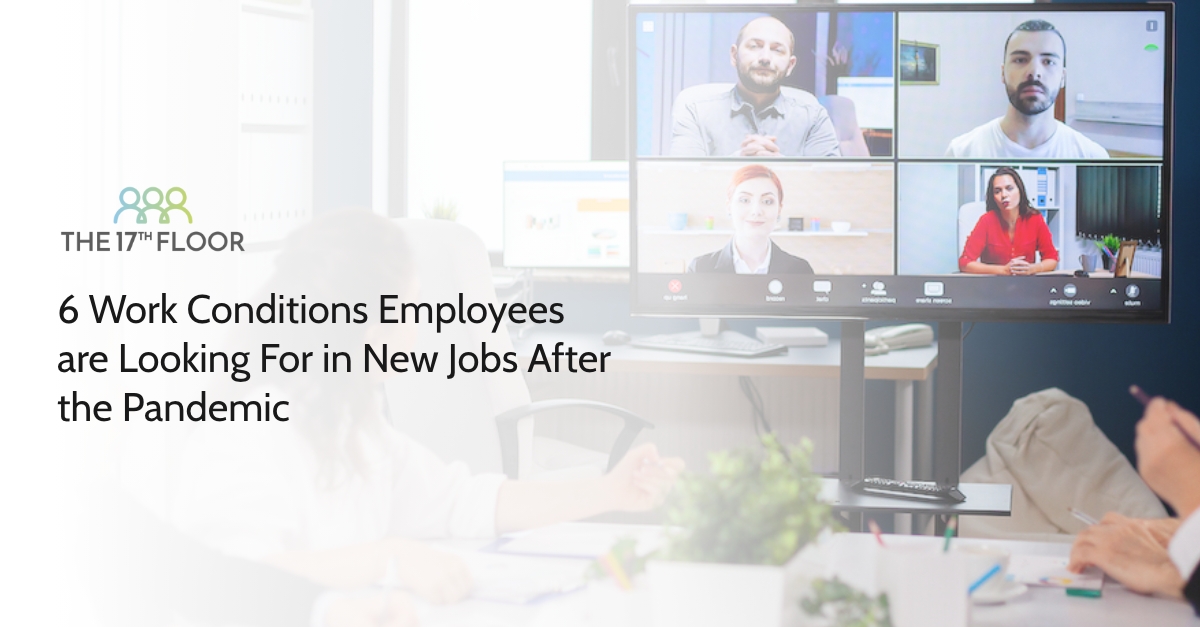6 Work Conditions Employees are Looking For in New Jobs After the Pandemic

“Organizations are facing the biggest talent crisis since the 2008 recession. However, this time around, people are no longer competing for jobs. Companies are competing for people,” affirms Estrella Frias.
“In today’s hyper-competitive job market, workers now enjoy more leverage to decide when and where they want to work, forcing many employers to make dramatic changes to their business models,” according to Laurie DuChateau and Nancy Vary.
Amid this new paradigm, there are certain factors that workers look for when searching for jobs. According to Estrella Frias, these are the six most common ones:
1. Happiness and Purpose First
Many are looking to make a career transition to find work that makes them happy, offers purpose and gives them a chance to explore their new passions. Among the many factors driving them to move on from existing jobs are better wages, better working conditions, opportunities for accelerated promotion and greater recognition.
2. Work-Life Balance
Work-life balance has long been important for employees. However, in today’s environment, it is no longer just a nice thing to have—it’s the top priority. Remote work during the pandemic gave employees a taste of a greater work-life balance than they had ever experienced, and many employees are refusing to go back into the office altogether.
As Paul Pittman, founding partner of The Human Well (THW), recommended in the 17th Floor latest webinar Why Adopting a Hybrid Work Model Will Help You Attract, Retain and Engage Your Employees, managers should choose the method that it’s most convenient for their companies and communicate it to their employees. Make sure they know if a hybrid work model is temporary or permanent.
3. Career Downsizing
Slogans such as “living your best life” and “finding your passion” are no longer well-intentioned, aspirational themes. They are the mantras of today’s workers, many of whom are deciding to downsize their careers. Instead of focusing solely on advancement and salary, employees also want careers and companies that allow for greater personal fulfillment.
4. Flexibility
People used to show up at the office and stay tethered to our desks. They were mostly content to be employed. Now, employees want to work from wherever, only come to the office when it’s convenient and meaningful, and claim back the time previously spent commuting.
5. Benefits
Job security, decent compensation and tangible opportunities for career advancement were previously enough for new hires. Now candidates are getting multiple offers and elevated titles (that sometimes don’t align with their experience).
As Josh Ruiters, Benefits Specialist, shared in the 17th Floor webinar What is your firm’s “Benefits Philosophy”?, employers you should think what your employees need and what are your company’s goal in order to think of a plan. Ask yourself if you want a flat plan, or a flexible plan for your employees. You can do surveys, or research data to better understand your options.
6. Values Alignment
Today, employees not only want to feel invested in their work, but they also want their employer to be invested in values similar to their own. If you want to know how to design a company culture and establish its values, we invite to watch this 17th Floor webinar where we discuss about this with David Owen Cord & Amin Lalani, Co-CEOs of Avanti.
Where does your company stand on these work conditions? Share your thoughts with other colleagues in the comments section.

Denise Burnett
I feel like my workplace encompasses all of these conditions. I have worked in other places that have not been so supportive and positive. I definitely feel fortunate to be able to work for my organization and that I have had the experience with others so I can truly appreciate it.